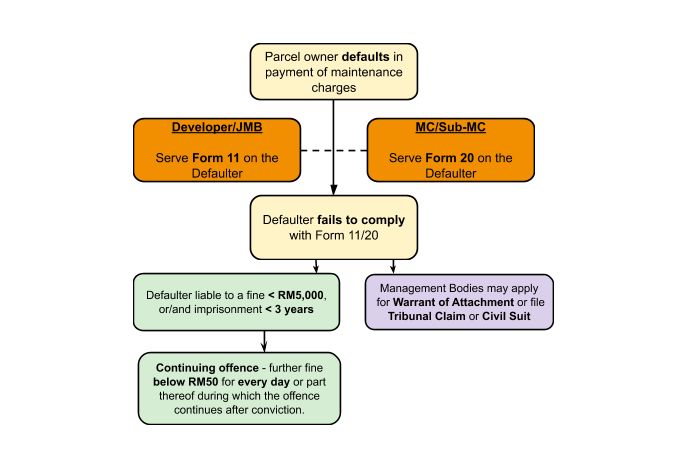The coming into force of the Strata Management Act 2013 and the Strata Management (Maintenance and Management) Regulations 2015 ("Regulations") together with the amendments to the Strata Titles Act 1985 in June 2015 streamlined the maintenance and management of strata schemes by providing comprehensive procedures, scope of powers and duties of developers, joint management bodies ("JMBs"), management corporations ("MCs") and subsidiary MCs (collectively referred to as "Management Bodies").
However, even with the current updated legislation, Management Bodies in strata schemes across the country constantly face one common problem: the default of maintenance charges payments and sinking fund contributions (collectively referred to as "Maintenance Charges") by parcel owners. This article aims to assist Management Bodies in considering the most appropriate, suitable and practical method in recovering outstanding Maintenance Charges from purchasers, parcel owners and proprietors.
HOW TO RECOVER OUTSTANDING MAINTENANCE CHARGES?
1. Publishing names of defaulters
Management Bodies may prepare a defaulters' list showing the names of the defaulting proprietors, their respective parcels and their outstanding amount. The Management Bodies may then display the defaulters' list on notice boards in the building. Take note that Management Bodies are required to update the defaulters' list at the end of every following calendar month.
2. Restricting access into building (deactivation of access cards)
Management Bodies may deactivate a defaulter's electromagnetic access device (card, tag, transponder) until the defaulter fully settles his outstanding Maintenance Charges including a charge not more than RM50 that may be imposed for the reactivation of the electromagnetic access device.
During the period of deactivation, Management Bodies may also require the defaulter to sign in a defaulters' register book each time the defaulter requires any assistance to enter or exit the building.
3. Restricting access/use of common facilities
Management Bodies may prohibit or suspend a defaulter from using the common facilities or services provided. This includes the prohibition of use of any common property car park bay which was initially designated for the defaulter.
4. Instalment payment scheme
Management Bodies may enter into a written instalment payment scheme with a defaulter. This scheme may include terms and conditions deemed fit and proper by the Management Bodies, including the number of instalments and withholding any deactivation of access cards or restriction to common facilities.
[Note: No. 1 to 4 above are expressly allowed under the Regulations]
5. Reporting to CTOS
Management Bodies may report defaulters to credit reporting agencies such as CTOS.
6. Notice of Demand (Forms 11 or 20)
Developers, JMBs and MCs may serve a notice of demand in Form 11 or Form 20 respectively on defaulters to demand for the payment of the outstanding Maintenance Charges. Forms 11 and 20 can be found in the Second Schedule of the Regulations. Service of Form 11 or Form 20 on the defaulters is necessary before the application for or filing of a Warrant of Attachment, Tribunal claim or civil suit respectively (see No.8, No.9 and No.10 below).
A defaulter who fails to comply with Forms 11 or 20 may be liable to an offence under Section 34(3) Strata Management Act 2013 and shall on conviction, be liable to a fine of not more than RM5,000 or imprisonment for a term not more than 3 years, or both. In the case of a continuing offence, the defaulter may be liable to a further fine not exceeding RM50 for every day or part thereof during which the offence continues after conviction.
7. Letter of Demand (LOD) from solicitors
Management Bodies may appoint solicitors to issue a letter of demand ("LOD") to a defaulter to demand for the payment of the outstanding Maintenance Charges.
8. Warrant of Attachment
Management Bodies may apply in writing to the Commissioner of Buildings ("COB") to issue a Warrant of Attachment. A Warrant of Attachment authorizes the attachment of any movable property belonging to the defaulter which may be found in the building or elsewhere in the respective State. In other words, the Management Bodies may force entry into the defaulter's property during daytime and seize the defaulter's moveable property in the presence of the COB.
The Management Bodies must then prepare an inventory of the property attached and serve a statutory notice on the person who was in possession of the property at the time of the attachment. After 14 days, property attached may be sold by auction conducted by the Management Bodies under the supervision of the COB. Perishable items in the property attached may be sold immediately after the attachment.
9. Filing a Strata Management Tribunal claim
Management Bodies may commence a claim at the Strata Management Tribunal to recover outstanding Maintenance Charges from a defaulter. However, the total amount of each claim must not exceed RM250,000.
Pursuant to Section 123 of the Strata Management Act 2013, any person who fails to comply with the Tribunal's award commits an offence and shall, on conviction, be liable to a fine not exceeding RM250,000 or to imprisonment for a term not exceeding 3 years or to both, and in the case of a continuing offence, to a further fine not exceeding RM5,000 for every day or part thereof during which the offence continues after conviction.
10. Filing a civil suit in Court
Instead of a Tribunal claim, Management Bodies may also commence a civil suit in Court to recover outstanding Maintenance Charges from a defaulter. It is always advisable that Management Bodies seek legal advice and representation for Court proceedings.

ILLEGAL METHODS
1. Clamping electricity/water supply
Management Bodies are not allowed to stop or clamp the defaulter's electricity and water supply. In the case of John Denis De Silva v Crescent Court Management Corporation [2006] 2 CLJ 605, the MC clamped the defaulter's water supply because the owner allegedly did not pay his water bill. The Court held that the MC's action interfered with the defaulter's enjoyment of the legal ownership of his own unit and had no legal basis to clamp the water supplies of parcel owners who owed water charges.
2. Prohibiting access into main or accessory parcel
Similarly, Management Bodies are also not allowed to prohibit a defaulter's access into his main and accessory parcel because he has a proprietary interest and indefeasible title over his property (see John Denis De Silva's case).
CONCLUSION
Maintenance charges payments and sinking fund contributions are essential elements in the maintenance and management of strata schemes. As such, it is equally important that Management Bodies implement a systematic, effective, fair and transparent procedure to collect and recover outstanding Maintenance Charges from defaulters in their respective strata schemes.
The content of this article is intended to provide a general guide to the subject matter. Specialist advice should be sought about your specific circumstances.

